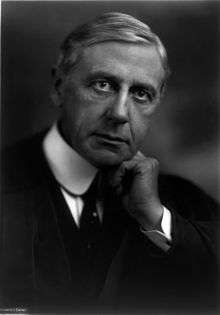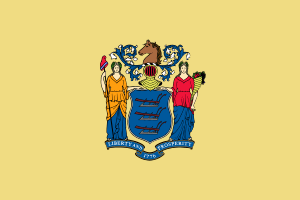Mahlon Pitney
| Mahlon Pitney | |
|---|---|
 | |
| Associate Justice of the Supreme Court of the United States | |
|
In office March 13, 1912 – December 31, 1922[1] | |
| Nominated by | William Taft |
| Preceded by | John Harlan |
| Succeeded by | Edward Sanford |
| Member of the U.S. House of Representatives from New Jersey's 4th district | |
|
In office March 4, 1895 – January 10, 1899 | |
| Preceded by | Johnston Cornish |
| Succeeded by | Joshua Salmon |
| Personal details | |
| Born |
February 5, 1858 Morristown, New Jersey, U.S. |
| Died |
December 9, 1924 (aged 66) Washington, D.C., U.S. |
| Political party | Republican |
| Spouse(s) | Florence Shelton |
| Alma mater | Princeton University |
| Religion | Presbyterianism |
Mahlon Pitney (February 5, 1858 – December 9, 1924) was an American jurist and Republican Party politician from New Jersey, who served in the United States Congress and as an Associate Justice of the United States Supreme Court.
Early life
Pitney was born in Morristown, New Jersey, the son of Sarah Louise (née Halsted) and Henry Cooper Pitney. He attended the College of New Jersey, now Princeton University, where he was a classmate of Woodrow Wilson and served as manager of the campus baseball team. Upon graduation in 1879, he entered into the study of law at his father's practice. Pitney passed the bar exam in 1882 and set up a private practice in Dover; he returned to Morristown in 1889 to assume control of his father's law firm, after Henry Pitney was appointed to a judgeship. Pitney married Florence Shelton in 1891. The couple had three children, and both of their sons entered into the field of law. Pitney was the great-grandfather of actor Christopher Reeve.[2]
Political career
In 1894, Pitney ran for the United States House of Representatives. He defeated one term incumbent Johnston Cornish for the seat from 4th congressional district, and he was reelected to a second term two years later. Pitney served as chairman of the 1895 state Republican convention and pushed for the nomination of John W. Griggs as party gubernatorial candidate. A rising star in state politics, Pitney aspired to be elected as governor. In order to further improve his local standing, he resigned from the House prior to the end of his second term and ran for election to the New Jersey Senate. Pitney was victorious in this 1889 race. In the legislature, he took on the role of party floor leader; after the 1900 election swayed body control to the Republicans, Pitney became Senate President.
Judicial career
Despite Pitney's desire to become the state's chief executive, Governor Foster M. Voorhees supported a different candidate as his successor. In 1901 Voorhees offered Pitney a seat on the New Jersey Supreme Court, which rid Voorhees of a political rival while maintaining party unity. Seven years later, Pitney was elevated to the role of Chancellor of New Jersey, a unique judicial position under the state's 1844 constitution.
Pitney was appointed to the U.S. Supreme Court by President William Howard Taft in 1912. Although confirmed by a 50-26 vote of the Senate, his nomination was opposed by progressives. This hostility was particularly due to his decision while serving as chancellor in Jones Glass Co. v. Glass Bottle Blowers Association, which limited the ability of unions to prevent their employers from using strikebreakers.
During his time on the court, Pitney developed a relatively conservative reputation and was an adherent of the judicial philosophy of substantive due process. This belief was exemplified in his majority opinion in Coppage v. Kansas, where, in ruling unconstitutional a Kansas statute banning anti-union yellow-dog contracts, the court stated that police power could not be legitimately utilized to ensure equality of bargaining power. Although distrustful of unions, Pitney also feared the rampant expansion of business and supported a broader use of the Sherman Antitrust Act.
Justice Pitney authored the majority opinion in New York Central Railroad Co. v. White, which upheld a New York state workman's compensation law and laid the foundation for the expansion of these programs nationwide.
Pitney resigned from the court in 1922 after suffering a stroke. He was one of only two Supreme Court Justices nominated by President Taft who also later served during Taft's tenure as Chief Justice. Pitney died in 1924 in Washington, D.C., and was interred at Evergreen Cemetery, in Morristown, New Jersey.
When asked which twentieth-century Supreme Court justice "has done the most to protect the core Constitutional values," Richard Epstein cited Justice Pitney, calling him "a great justice" and "the only consistent near-libertarian on the Supreme Court." [3]
References
- ↑ "Federal Judicial Center: Mahlon Pitney". 2009-12-12. Retrieved 2009-12-12.
- ↑ Ancestry of Christopher Reeve. William Addams Reitwiesner Genealogical Services. Accessed September 23, 2007.
- ↑ Law Talk Episode 37: Recess Appointments 2/3/2013
External links
| Wikimedia Commons has media related to Mahlon Pitney. |
- Oyez.com biography for Mahlon Pitney
- Supreme Court Justices: Mahlon Pitney (1858-1924)
- History of Morris County New Jersey, Volume II
- Facts on File biography for Mahlon Pitney
- United States Congress. "Mahlon Pitney (id: P000370)". Biographical Directory of the United States Congress.
- Mahlon Pitney at The Political Graveyard
- Mahlon Pitney at Find a Grave
| United States House of Representatives | ||
|---|---|---|
| Preceded by Johnston Cornish |
Member of the U.S. House of Representatives from New Jersey's 4th congressional district 1895–1899 |
Succeeded by Joshua Salmon |
| Political offices | ||
| Preceded by William Johnson |
President of the New Jersey Senate 1901 |
Succeeded by Asa Francis |
| Legal offices | ||
| Preceded by John Harlan |
Associate Justice of the Supreme Court of the United States 1912–1922 |
Succeeded by Edward Sanford |
| | |||||||||||||||||||
|---|---|---|---|---|---|---|---|---|---|---|---|---|---|---|---|---|---|---|---|
|
 | ||||||||||||||||||
